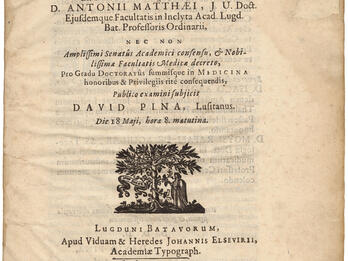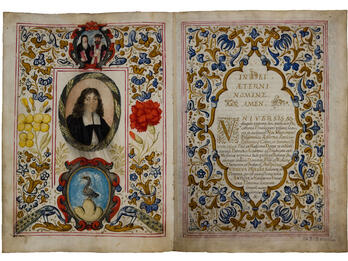Letter to Jarig Jelles
To the Most Worthy and Wise Mr. Jarig Jelles
From B. d. S.
[Dear Friend],
As far as Politics is concerned, the difference you ask about, between Hobbes and me, is this: I always preserve natural Right unimpaired, and I maintain that in each State the Supreme Magistrate has no more right over its subjects than it has greater power over them. This is always the case in the state of Nature.
Next, regarding the demonstration I establish in the Appendix of the Geometric demonstrations of Descartes’ Principles, namely that God can only very improperly be called one or unique, I reply that a thing is said to be one or unique only in relation to its existence, but not to its essence. For we don’t conceive things under numbers unless they have first been brought under a common genus.
For example, someone who holds a penny and a dollar in his hand will not think of the number two unless he can call the penny and the dollar by one and the same name, either “coin” or “piece of money.” For then he can say that he has two coins or two pieces of money, since he calls not only the penny, but also the dollar, by the name “coin” or “piece of money.”
From this it’s evident that nothing is called one or unique unless another thing has been conceived which (as they say) agrees with it. But since the existence of God is his essence, and we can’t form a universal idea concerning his essence, it’s certain that someone who calls God one or unique does not have a true idea of God, or is speaking improperly about him.
As for shape being a negation, and not something positive, it’s manifest that matter as a whole, considered without limitation, can have no shape, and that shape pertains only to finite and determinate bodies. For whoever says that he conceives a shape indicates nothing by this except that he conceives a determinate thing, and how it is determinate. So this determination does not pertain to the thing according to its being, but on the contrary, it is its non-being. Therefore, because the shape is nothing a but a determination, and a determination is a negation, as they say, it can’t be anything but a negation.
I’ve seen in a Bookseller’s window the book the Utrecht Professor1 wrote against mine, which was published after his death. From the few things I read at that time, I decided it was not worth reading, much less answering. So I left the book lying there, along with its author. I smiled to myself that the most ignorant are generally the boldest and the readiest to write. It seems to me that the . . . offer their wares for sale in the same way Shopkeepers do, who always show the worst goods first. They say the Devil is a very cunning fellow. But to me it seems that their mind far surpasses his in craftiness. Fare well.
Notes
Words in brackets appear in original translation.
The Utrecht professor was Reiner van Mansvelt (1639–1671), a Cartesian whose Adversus anonymum theologo-politicum liver singularis was published in Amsterdam in 1674.
Credits
Published in: The Posen Library of Jewish Culture and Civilization, vol. 5.




